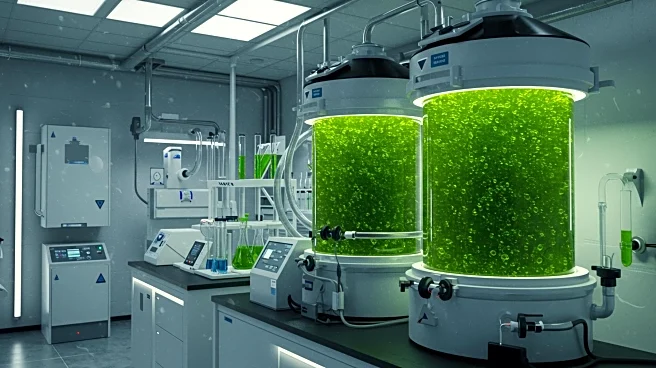What's Happening?
A research team at the TUMCREATE research campus in Singapore is developing a meat alternative using microalgae and soy beans. These raw materials are chosen for their high protein content, with microalgae containing up to 60-70% protein. The team processes these single-cell organisms to extract proteins, which are then studied for taste and structural properties. The research focuses on processing these proteins to achieve desirable textures and mouthfeel, leveraging the self-assembly properties of the proteins. This development is particularly suited for urban environments like Singapore, where space for traditional agriculture is limited.
Why It's Important?
The development of algal protein-based mock meat represents a significant advancement in sustainable food production, particularly in urban areas with limited agricultural space. By utilizing microalgae, which can be grown in reactors, this approach offers a viable solution to meet the growing demand for protein-rich foods without relying on traditional farming methods. This innovation could reduce the environmental impact associated with meat production, such as land use and greenhouse gas emissions, while providing a nutritious alternative. The research also highlights the potential for materials science to contribute to food technology, offering new avenues for creating sustainable food sources.
What's Next?
The next steps for the research team involve further refining the processing techniques to enhance the taste and texture of the algal protein-based mock meat. As the project progresses, there may be opportunities for collaboration with food industry stakeholders to bring this product to market. Additionally, the team may explore scaling up production to meet commercial demands, potentially influencing urban food systems globally. Stakeholders in the food industry and environmental sectors will likely monitor these developments closely, considering the implications for sustainable food production and urban agriculture.
Beyond the Headlines
This research could have broader implications for the food industry, particularly in terms of ethical and environmental considerations. The shift towards plant-based and alternative proteins is gaining momentum as consumers become more conscious of the environmental impact of their food choices. The use of microalgae, a renewable resource, aligns with these values and could drive further innovation in the sector. Additionally, the project may inspire similar initiatives in other urban areas, promoting local food production and reducing reliance on imported goods.








